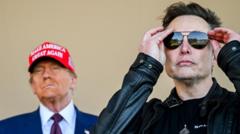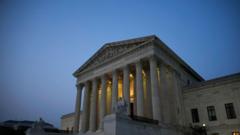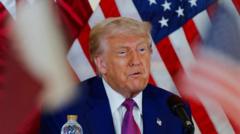**In a dramatic turn of events, Elon Musk's intervention in Congressional negotiations led to a failed stopgap spending bill, leaving the Republican Party grappling with factionalism and uncertainty ahead of a looming government shutdown.**
**Elon Musk's Influence Sends Shockwaves Through Congress Amid Shutdown Talks**

**Elon Musk's Influence Sends Shockwaves Through Congress Amid Shutdown Talks**
**Musk's vocal opposition complicates bipartisan funding agreement as political tensions rise in Washington.**
In a surprising twist in Washington politics, Elon Musk's influence has disrupted the attempt to pass a stopgap funding bill, pushing Congress towards a potentially chaotic government shutdown. This week saw bipartisan efforts to fund government operations stall, primarily fueled by Musk's outspoken criticism of a compromise reached between Republican House Speaker Mike Johnson and Democrats.
Musk, the tech billionaire behind multiple high-profile ventures, took to his platform, X, to voice his disapproval of the proposed agreement intended to keep the government running until mid-March. His barrage of posts, which at times spread misleading claims, seemed to stir a faction among conservative lawmakers. This culminated in Donald Trump, sensing the growing dissent, announcing his own opposition to the funding plan by denouncing it as wasteful and demanding significant changes to the debt limit.
As the situation unfolded, the bipartisan bill lost traction, with 38 Republicans voting against it alongside most Democrats, highlighting the fractures within the GOP. Musk, celebrating his perceived win, declared, "the voice of the people has triumphed", yet many analysts suggested it was more about his influence than a true representation of public opinion.
On the following day, Republicans advanced a new proposal that temporarily funded the government, suspended the debt limit for two years, and included some disaster response measures. Yet the specter of Musk’s intervention loomed large, drawing mockery from Democrats and skepticism from within the Republican ranks. Some GOP members expressed confusion over Musk's roles, questioning his relevance in legislative discussions.
This latest episode in Congress highlights the continuing challenges facing the Republican majority, as internal divisions persist despite hopes for a united agenda under Trump's leadership. The complexities of Trump’s approach, particularly his unexpected insistence on raising the debt limit, add another layer of unpredictability to an already volatile dynamic within the party.
Republicans now confront the reality that without a cohesive strategy, they may struggle to maintain legislative momentum and may need to seek support from Democrats for essential funding measures. Observers warn that the absence of political harmony could jeopardize Trump's legislative goals even before he takes office.
As lawmakers scramble to find a viable path forward, concerns are growing about Johnson's grip on his party. After a week of heated discussions, some Republicans openly doubted his capability to continue as Speaker, questioning his authority and leadership in the wake of Musk's interference.
Overall, this week's events may serve as a precursor for the difficulties Trump and House Republicans may face in future negotiations, as they attempt to balance party dissension with the necessity of achieving legislative success. The pressure is mounting to avert a longer shutdown, but internal conflicts remain a significant hurdle for the party as they approach the new Congress.




















